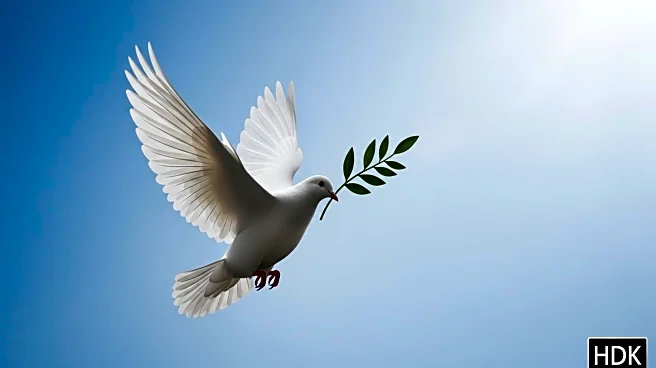What is the story about?
What's Happening?
The Israeli military has confirmed the release of seven hostages by Hamas, marking the first group freed under a ceasefire agreement that paused a two-year conflict between Israel and Hamas in the Gaza Strip. These hostages will be transferred to a military base in southern Israel for reunification with their families and subsequent medical evaluation at Israeli hospitals. This release is part of a larger exchange where Hamas has agreed to release 20 living hostages in return for over 1,900 Palestinian prisoners held by Israel. The ceasefire, brokered under international pressure, aims to end the deadliest war between Israel and Hamas, which began with a surprise attack by Hamas in October 2023. The exchange has sparked celebrations among Israelis, while Palestinians await the release of prisoners. President Trump is visiting the region to discuss postwar plans and the U.S.-proposed deal.
Why It's Important?
The release of hostages and prisoners is a significant step towards resolving the prolonged conflict between Israel and Hamas, which has resulted in substantial loss of life and displacement. The ceasefire and subsequent exchanges could pave the way for humanitarian aid to enter Gaza, addressing the dire needs of its residents. The involvement of international leaders, including President Trump, underscores the geopolitical importance of the region and the potential for broader peace initiatives. The agreement also raises questions about the future governance of Gaza and the role of Hamas, with implications for regional stability and international relations.
What's Next?
The ceasefire agreement includes plans for an international body to govern Gaza, with Palestinian technocrats managing daily affairs. An Arab-led international security force, along with Palestinian police trained by Egypt and Jordan, is expected to deploy as Israeli forces withdraw. The U.S. plan also hints at the possibility of a future Palestinian state, although this remains contentious. The release of Palestinian prisoners is anticipated, with Israel warning against celebrations in the West Bank. The reconstruction of Gaza, estimated to cost billions, will require international cooperation and funding. The ceasefire's success depends on the disarmament of Hamas and the withdrawal of Israeli troops from Gaza.
Beyond the Headlines
The ceasefire and prisoner exchange highlight the complex dynamics of Middle Eastern politics, where historical grievances and territorial disputes continue to challenge peace efforts. The humanitarian crisis in Gaza, exacerbated by the conflict, demands urgent international attention and resources. The role of the U.S. and other international actors in mediating the conflict reflects broader geopolitical interests and the pursuit of stability in a volatile region. The future governance of Gaza and the potential for a Palestinian state remain critical issues that could reshape regional alliances and influence global diplomatic strategies.















